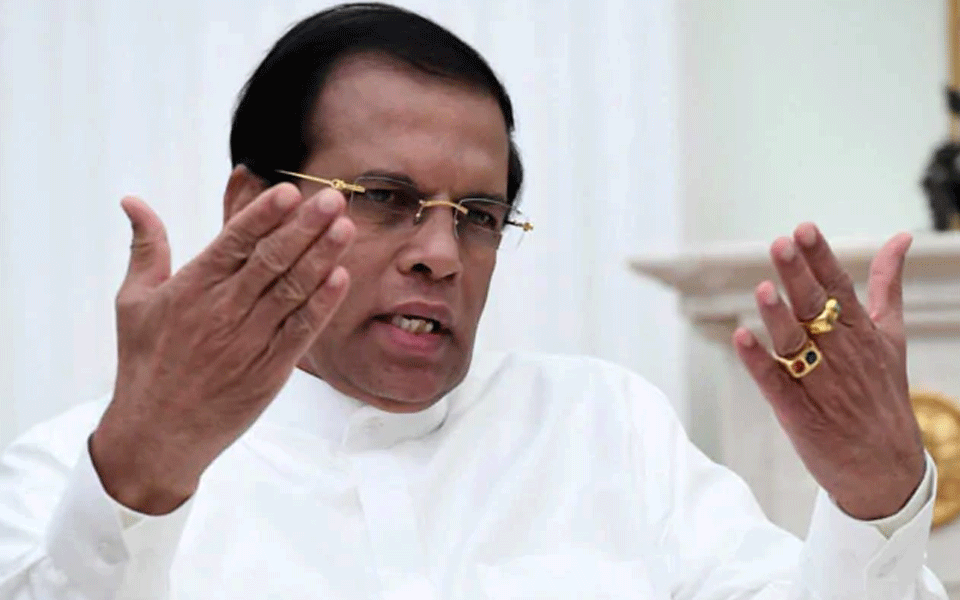Colombo, Nov 4 : Sri Lanka's President Maithripala Sirisena on Sunday announced reconvening of Parliament on November 14, which he had suspended last month, two days after sacking Prime Minister Ranil Wickremesinghe and replacing him with former strongman Mahinda Rajapaksa.
According to a gazette notification, issued by his Secretary Udaya R Seneviratne on Sunday evening, the assembly would be recalled on November 14.
In a dramatic turn of events, Rajapaksha was sworn in as new Prime Minister of the Indian Ocean island nation on October 26 after Sirisena sacked premier Wickremesinghe who termed the move as "unconstitutional" and vowed to prove his majority in Parliament.
The sudden development came amid growing tensions between Sirisena and Wickremesinghe on several policy matters and the President has been critical of the Prime Minister and his policies, especially on economy and security.
Sirisena's moves triggered a power struggle that some observers called a constitutional crisis.
Wickremesinghe termed the Sri Lankan president's move as "unconstitutional and illegal" and refused to leave the official residence, claiming he was still the legally appointed prime minister.
He also demanded a floor test in Parliament, following which Sirisena suspended Parliament on October 28 till November 16.
Wickremasinghe's United National Party handed over a motion of no confidence against new Prime Minister Rajapaksa. Senior UNP member Lakshman Kiriella said that Secretary General of Parliament was informed of the motion.
Since the suspension, Speaker Karu Jayasuriya came under pressure from political parties to defy Sirisena and reconvene the 225-member assembly.
The suspension was seen as a move to help Sirisena's prime ministerial nominee Mahinda Rajapaksa to cobble out his parliamentary majority.
The Rajapaksa-Sirisena combine has 96 MPs in the 225-member assembly, which is 17 short of the 113 required working majority.
But, with defection of at least nine legislators from Wickremesinghe's UNP and from the main Tamil party, TNA, Rajapaksha claims that he is just eight seats short of majority.
According to parliamentary officials, it was up to the parliamentary party leaders to agree if a floor test should be included in the agenda when the House is reconvened.
Foreign governments, rights groups, the United Nations have urged Sirisena to summon Parliament immediately and end the crisis.
Let the Truth be known. If you read VB and like VB, please be a VB Supporter and Help us deliver the Truth to one and all.
Hyderabad (PTI): Telangana Chief Minister A Revanth Reddy met Union Home Minister Amit Shah in Delhi on Wednesday night and urged him to increase the sanctioned strength of IPS officers to the state in view of its growing administrative and security needs.
The two leaders also discussed the recent surrender of several senior Maoist leaders before the Telangana Police and other issues.
"During the meeting, the two leaders discussed the issue of Maoist surrenders and their rehabilitation. The chief minister informed Shah that significant improvements in policing have taken place in Telangana over the past two years," an official release here said.
Highlighting that 591 Maoists have laid down their arms and joined the mainstream of society during this period, the chief minister said the state government was providing them compensation and rehabilitation assistance as per the rules.
He requested the Union home minister to extend financial support from the central government for development works in the backward regions of the state.
Reddy also urged Shah to increase the sanctioned strength of IPS officers to the state from 83 to 105 in line with the state's growing administrative and security needs, the statement said.
The first cadre review after the formation of Telangana was conducted in 2016, while the next review, due in 2021, was delayed and finally carried out in 2025. Even then, only seven additional IPS officers were allocated to the state, the chief minister informed Shah and requested that the third cadre review be conducted in 2026 as per the schedule.
Reddy explained that Telangana, like the rest of the country, is facing several modern challenges, including cybercrime, drug trafficking, white-collar crimes, and other emerging security threats.
He highlighted the reorganisation of the Hyderabad, Cyberabad, and Malkajgiri Police Commissionerates, the proposed formation of the Future City Commissionerate and the rapidly growing population in Hyderabad to underline the increasing administrative requirements of the state.





